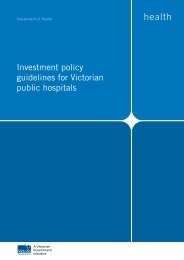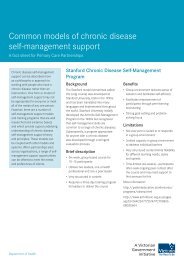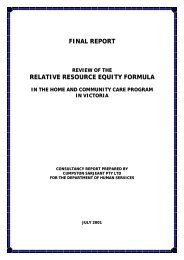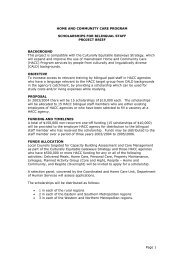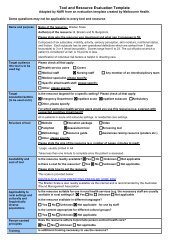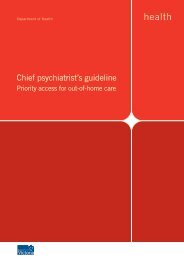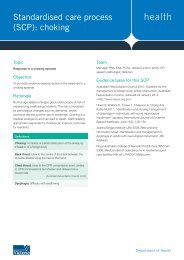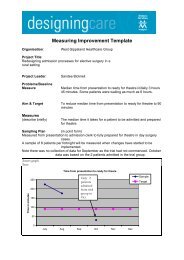Chief Psychiatrist's annual report 2008-09 - Department of Health
Chief Psychiatrist's annual report 2008-09 - Department of Health
Chief Psychiatrist's annual report 2008-09 - Department of Health
You also want an ePaper? Increase the reach of your titles
YUMPU automatically turns print PDFs into web optimized ePapers that Google loves.
34 <strong>Chief</strong> Psychiatrist’s <strong>annual</strong> <strong>report</strong> <strong>2008</strong>–<strong>09</strong><br />
7 Working with the department and other stakeholders<br />
The <strong>Chief</strong> Psychiatrist and staff from the <strong>of</strong>fice work closely with colleagues in the <strong>Department</strong>s <strong>of</strong><br />
<strong>Health</strong> and Human Services, particularly the Mental <strong>Health</strong>, Drugs and Regions (MHDR) Division.<br />
The <strong>Chief</strong> Psychiatrist is involved in various policy, process and operational matters relating to<br />
mental health service delivery, where the <strong>of</strong>fice’s interface with service providers and service users<br />
can bring a first hand perspective to the issues being considered. The <strong>Chief</strong> Psychiatrist and staff<br />
are also involved in a number <strong>of</strong> departmental and interdepartmental committees.<br />
Liaison also occurs with a range <strong>of</strong> government, non-government and advocacy bodies including<br />
the Public Advocate, <strong>Health</strong> Services Commissioner, the Coroner, Mental <strong>Health</strong> Review Board,<br />
the Ombudsman and the <strong>Department</strong> <strong>of</strong> Justice on matters <strong>of</strong> common interest and in response to<br />
specific issues as they arise.<br />
Some key areas <strong>of</strong> involvement during the <strong>report</strong>ing period have also been with the Office <strong>of</strong> the<br />
Senior Practitioner in jointly seeking to improve outcomes for dual disability consumers 16 who come<br />
to the attention <strong>of</strong> either <strong>of</strong>fice, and with the Multiple and Complex Needs Panel on care plans for<br />
complex clients.<br />
7.1 Mental <strong>Health</strong> Triage Project<br />
In 2007 the <strong>Chief</strong> Psychiatrist led the development <strong>of</strong> a draft mental health triage scale and<br />
guidelines in consultation with the MHDR Division’s Mental <strong>Health</strong> Triage Scale Advisory<br />
Committee, which comprised consumer and carer representatives, senior clinical experts from the<br />
mental health sector and divisional staff.<br />
The scale is a rating system that guides clinicians in classifying triage contacts according to level<br />
<strong>of</strong> urgency and the response required by mental health and other services. The purpose <strong>of</strong> the<br />
scale is to promote a more consistent and clinically appropriate response to consumers, carers and<br />
referrers seeking access to mental health services, and aid data collection about service access,<br />
utilisation and demand.<br />
Throughout <strong>2008</strong> the scale was piloted at 13 mental health services across the state, supported<br />
by a training program including an e-learning component. The scale and the training program<br />
have been formally evaluated and the findings used to inform further refinement <strong>of</strong> the scale and<br />
guidelines. It is anticipated that the triage scale will be introduced in all Victorian area mental health<br />
services in 2010.<br />
The draft scale and guidelines, and further information about the project, can be found at<br />
www.health.vic.gov.au/mentalhealth/triage.<br />
7.2 Review <strong>of</strong> secure extended care services<br />
There has been a growing demand for secure extended care unit (SECU) beds over recent years,<br />
particularly for younger men with a dual diagnosis whose associated drug and alcohol issues places<br />
them or the community at risk. Victoria has an acknowledged shortage <strong>of</strong> secure extended care<br />
beds in both the general and forensic sectors. The <strong>Chief</strong> Psychiatrist regularly receives requests<br />
from mental health services to facilitate access to such beds. The frequency <strong>of</strong> these requests is<br />
increasing and metropolitan and rural units all <strong>report</strong> long waiting lists.<br />
16 People with an intellectual disability and mental illness.



